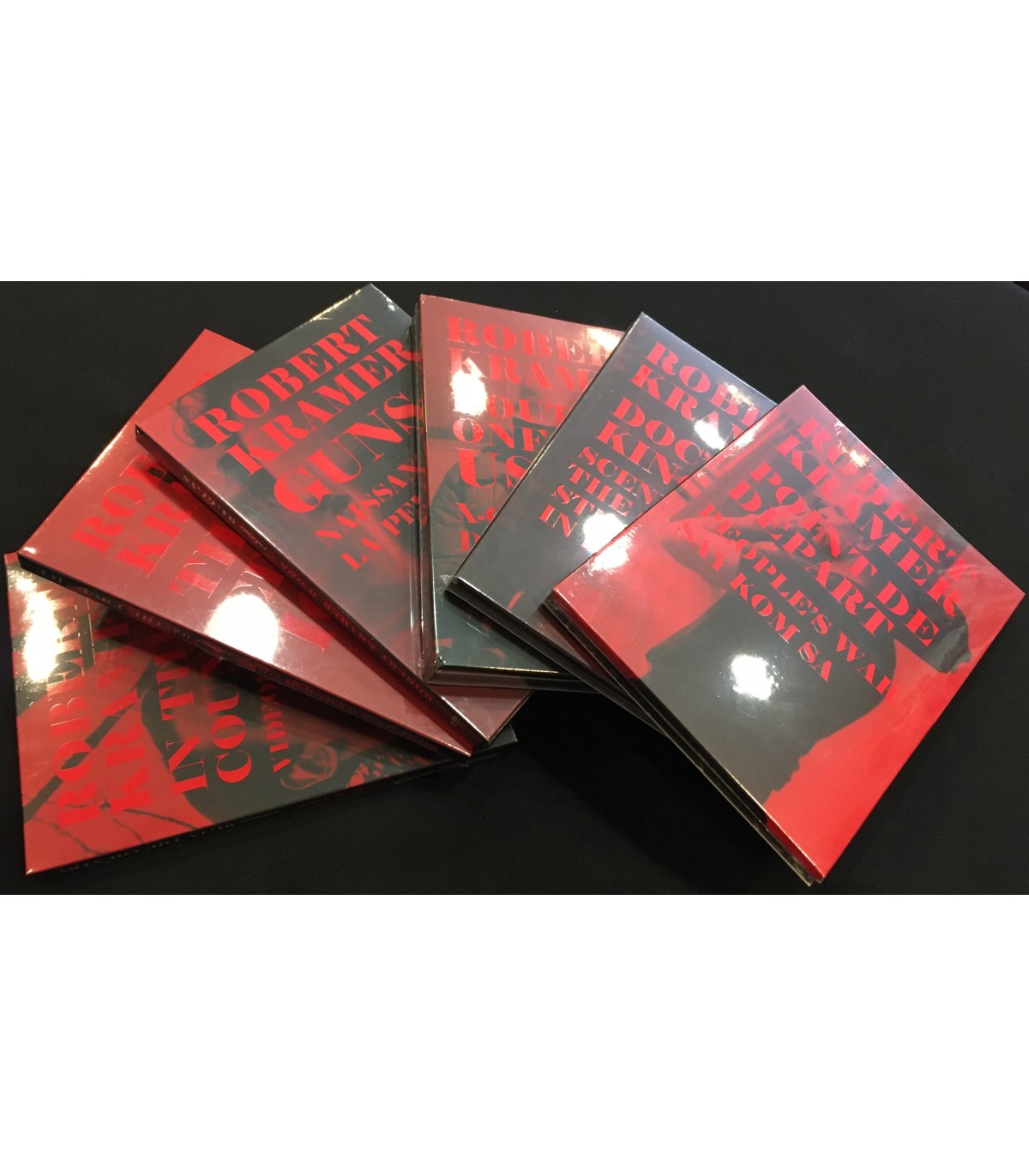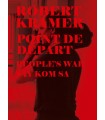Pack of 6 DVD/Blu-Ray titles of films by Robert Kramer at a special promotional price
This pack includes 6 DVD/Blu-Ray titles of films by Robert Kramer at a special promotional price
Blu-ray/DVD - Doc's Kingdom / Scenes from the Class Struggle in Portugal
Following the Carnation Revolution in 1975, Robert Kramer forged a powerful political and cinematic bond with Portugal, which he expressed in four successive projects: With Freedom in Their Eyes (1976), a book of photographs taken in Angola when the country was liberated from Portuguese colonial rule and descended into civil war; the activist documentary Scenes from the Class Struggle in Portugal (1977), which analyzes the country’s revolution; Wim Wenders’ The State of Things (1982), made with Portuguese producer Paolo Branco, filmed in Sintra and co-scripted by Kramer; Doc’s Kingdom (1988), produced by Paolo Branco, in which the Doc character, first seen in Ice in 1969, wistfully drifts around Porto’s docks before returning to the United States two years later in Route One/USA.
“I’ve been living and filming abroad since 1979. Doc’s Kingdom is the first of the last eight movies I’ve been able to shoot in english. It is also the first to get back into my material : the USA, a home, a home land, what you are inevitably a part of and what you are forever outside.” (Robert Kramer)
FILMS
DOC'S KINGDOM / 1988 / 90'
SCENES FROM THE CLASS STRUGGLE IN PORTUGAL / 1977 / 90'
+ 52-page bilingual booklet
Blu-ray/DVD - In the Country
In the United States in 1966, Robert Kramer directed his first feature film, In the Country, outside all existing production systems and with the political fellow travelers who had just filmed him in the documentary Troublemakers. In the Country shows what is left out of Troublemakers: the documentary shows actions (community organizing, militant activism) that the fictional film keeps outside the frame in order to focus on a relationship crisis in which the man fails to put aside, for a few days, his obsessive political activism. Twenty-five years later, the Videoletters exchanged with Stephen Dwoskin recreate as in an open mosaic this melancholic and lyrical treatment of separation.
“‘In the country’ is the place where one comes into contact with other, absolutely non-political and everlasting rhythms of things. Their guardian is the woman: she is wise and can appear in many forms, but she knows quite a lot about finding a harmonious balance between your own needs and those of others. Another form of logic.” (Robert Kramer)
includes a 57 page bilingual booklet
FILMS
In The Country (1966), 62 min
Videoletters (1992), 56 min
Troublemakers (1965), 52 min
Blu-ray/DVD - The Edge & Ice
The Edge (1967) and Ice (1969) form a definitive diptych on the temptations of terrorism and insurrection: a man wants to assassinate the President of the United States (The Edge); revolutionary groups launch a major armed offensive against the ruling regime (Ice). However, both fictions are less interested in the impact of activism than in the moral state of shock that gradually shifts relationships and beliefs as it overlays another sense of time and other types of logic on those of revolutionary efficiency. Made in parallel with Robert Kramer’s own militant activism in Newsreel and other organizations of the American left, which they contradict dialectically, they are an extraordinary application of filmmaking considered as a tool of thought in motion.
“I think that now, based on a lot of Ice’s contradictions – between men and women, between ‘activism’ and ‘living,’ between life and death – I think that now, we are starting to understand the synthesis, or at least the very diverse forms of synthesis that will help us create a higher, clearer level of consciousness, and therefore a higher level of activism.” (Robert Kramer)
includes a 42 page bilingual booklet
FILMS
The Edge (1967), 1h41
Ice (1969), 2h13
Blu-ray/DVD - Route One/USA
Shot over five months in 1987 and 1988 from north to south along the East Coast, Route One / USA (1989) offers a broad geographical cross-section of a precise time in United States history, and a wistful journey through a country that Robert Kramer, as an America, had never looked at so carefully. In the company of his fictional alter-ego, Doc, the doctor, the filmmaker observes people and landscapes with the care and concern of a traveling doctor. Route One / USA is also a magnificent combination, to the sound of Barre Philips' music, of a filming method that Kramer had developed a few weeks earlier in the lesser-known X-Country (1987) and an editing technique that he would perfect the following year in the video-letter Dear Doc (1990).
“Route One / USA stems from a very deliberate choice to return to the scene of the crime. The interesting thing about this film - as different as it is from Milestones, even in the way it was shot - is that in Milestones we were able to go all over the country without ever talking to anyone who was not from our crew. Route One / USA was the exact opposite: we were just there to talk, to listen and to learn.” (Robert Kramer)
includes a 62 page bilingual booklet
FILMS
Route One / USA (1966), 255 min, color, 16mm
X-Country (1992), 144 min, color, video
Dear Doc (1965), 36 min, color, video
DVD - Guns
Following a series of films questioning commitment and politics in America and culminating with Milestones 1975, and a 1977 documentary on Lisbon’s Carnation Revolution, Scenes from the Class Struggle in Portugal, Robert Kramer moved to France with his family. The first film he made there was Guns, an intricate feature which echoed the paranoid films of 1970’s Hollywood. With Guns, Kramer continues his exploration of the militant psyche, while at the same time experimenting with different forms of narration.
“There are two distinct strands of reality in Guns. One deals with the world at large. Tony (Patrick Bauchau), a journalist, speaks of ‘a nonsensical story.’ We no longer have any way to penetrate this wider world. The other strand concerns our intimate and personal experiences, as represented by Margot (Juliet Berto), who has decided to dedicate herself to caring for her dying mother. This strand comprises everything that results from her decision. I used the decline of Margo’s mother as a means of discussing certain things.”
-Robert Kramer
includes a 56 page bilingual booklet
FILMS
Guns (1980)
Naissance (1981)
La Peur (1983)
DVD - Point de départ, People's War & Say Kom Sa
Vol. 9 in the WORK series of DVDs with films by Robert Kramer with the films Point de départ, People's War & Say Kom Sa
As for many Americans of his generation, the Vietnam War was a crucial event in Robert Kramer’s intellectual journey. In the mid-1960s, he published two articles of political analysis and wrote an unrealized screenplay about the war, before going to Vietnam in 1969 with other members of Newsreel to shoot People’s War, a medium-length film about the North-Vietnamese struggle. Almost thirty years later, in 1998, he returned to the now pacified country in the throes of globalization, where he filmed a short video chronicle, Say Kom Sa. In between these two films, Point de départ, a documentary masterpiece in the floating camera and fragmented editing style that Kramer developed since Our Nazi, bridges the gap between the country’s past that cannot be healed and a present without a future.
“The idea of going back to Vietnam hasn’t always been with me, but during the Gulf War, I realized that it had been a long time since I’d been abroad to film. So I made the grotesque plan of going all over the place to see what was left, in the early 1990s, of the idea of ‘the Other’. What was going on over there? The idea behind the project was really to see how things were going for the Vietnamese, but at the same time, how were things going for me? I’m always looking for that double voice.” (Robert Kramer)
FILMS
PEOPLE’S WAR : (NEWSREEL #43)
USA / 1969 40 min, b/w 16mm
Producers: Third World Newsreel
Directors: Robert Kramer, John Douglas, Norman Fruchter
POINT DE DÉPART
France / 1993 90 min, color 35mm
Producers: La Sept, Les Films d’Ici, L’Association des cinéastes vietnamiens, Channel Four
Director: Robert Kramer
Sound: Olivier Schwob
With: Linda Evans, Viet Tung, Robert Kramer
SAY KOM SA
France / 1998 19 min, color video
Producers: Les Films d’Ici, Richard Copans, Caroline Olive
Director: Robert Kramer
Sound: Le Hong Chuong









































